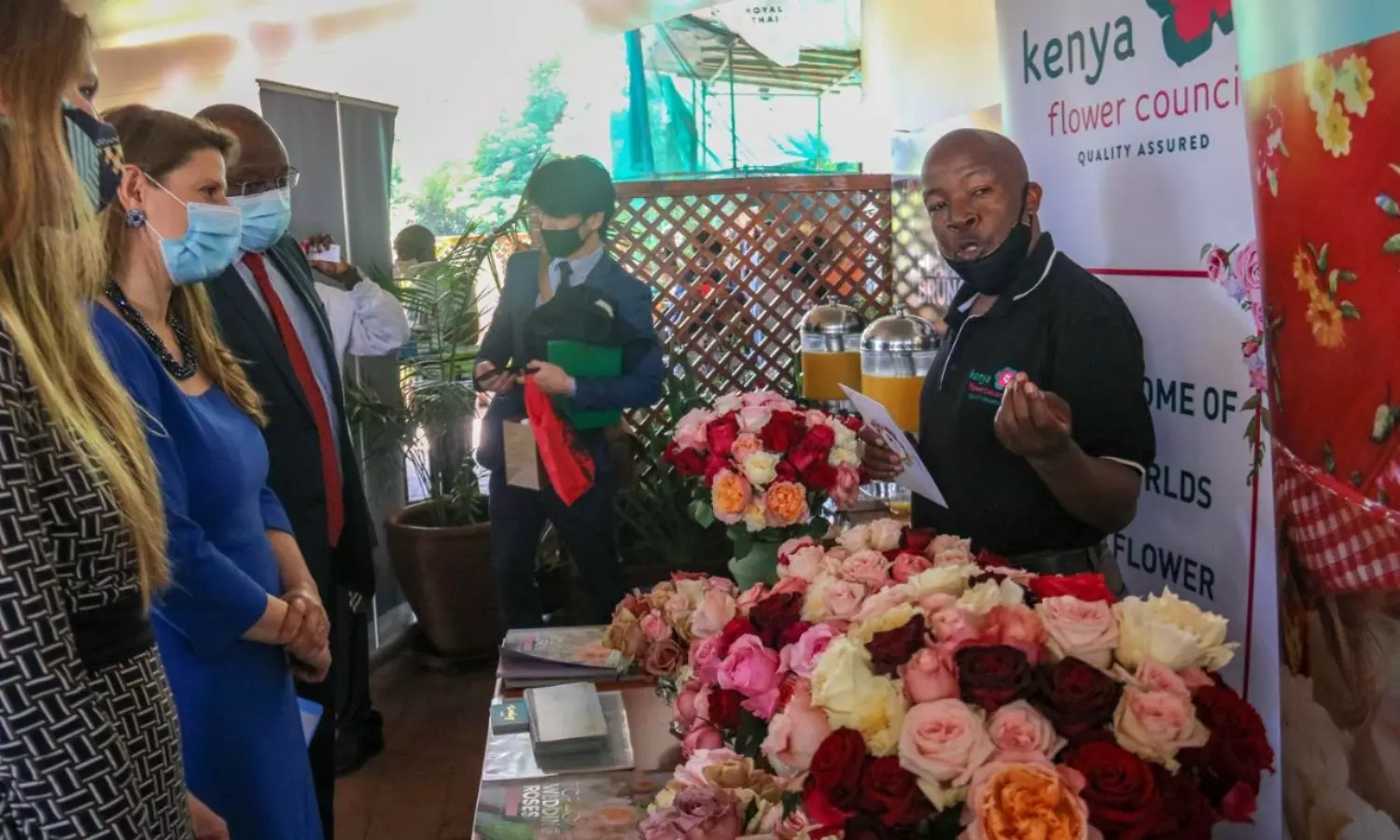Capacity is the name of the game
The game of moving flowers from Africa to the rest of the world was controlled by many factors while the climate and peak season was not the least. However, Covid-19 has changed the game completely towards favouring the balancing act of capacity.

As the new Valentine's Day is approaching and Mother's Day is not too far away, flower logistics is one of the most affected among the global supply chain network and as an important product from Africa. However, how the continent and logistics companies are circumventing the challenges is truly inspiring for anybody who has an interest in the world of business and economics.
Air France KLM Martinair Cargo's director eastern & southern Africa Pierluigi Vigada notes that it's difficult to separate the old "peak season" versus the "low season".
"Normally we were used to discuss with the market two fully separated periods of the year, mainly linked to local production versus European one. Coldish weather at these latitudes versus hot production weather in the Northern hemisphere. Those days seem to have disappeared. Discussions are more linked to capacity needs and rates," he said.
Capacity is the name of the game. The scarcity has triggered higher freight charges and consequently a different approach to the shipping habits of many growers.
"Some of the low-end products have reduced or ceased their outputs to the advantage of the high-end ones. Prices at the auction have been generally high allowing growers to support the increased costs of production and shipping while the retailers have been more impacted by the surge of the costs," he added.
Vigada took the example of Kenya, being the biggest of the countries in Africa in terms of stems exported, to explain how it has found a better balance in the last months where the industry has adapted to the changed capacity.
"Better planning avoiding peak flushes seems to have driven the industry to a new norm where the production is more linked to the capacity available rather than the opposite," he said.
Being the third year since the onset of the Covid-19 pandemic, the business and movement of flowers have been challenged and redefined. They have been grappling with high tariffs in emerging markets, changes of regulations in the marketplace & restrictions in some markets due to Covid-19.
Clement Tulezi, chief executive officer of Kenya Flower Council, said, "Locally, the biggest challenge is the shortage of capacity and the associated costs of air freight. We are experiencing weekly cancellations of flights. We need 5,000 tonnes against the 3,500 tonnes available per week. Yet, the Valentines period is setting in, where we need to move more volumes. We are lobbying the government to authorize direct flights to the market by operators servicing Nairobi, permission to charter and for government to reassure airlines that Kenya has taken necessary measures to mitigate the risks associated with the spread of Covid-19."
"On the brighter side, we are exploring the use of sea freight as a longer-term solution to augment airfreight. With trials ongoing, the outcomes have been inspiring thus far. We are also working with local government economic blocs to make use of other airports in Kenya to move horticultural exports directly to the international markets. So far, we have seen good responses by the Eldoret and Kisumu International Airport," he said.
"In addition, a sustainable option that could lead to gains around the global discourse on CO2 emissions; and the fact that Kenya made a commitment of zero-emission by transport at COP26 in Glasgow. As such, we are targeting to transport 50 percent of fresh exports by sea by the year 2030," he added.
Better planning avoiding peak flushes seems to have driven the industry to a new norm where the production is more linked to the capacity available rather than the opposite.
Pierluigi Vigada, Air France KLM Martinair Cargo
Omicron challenge
Covid has severely impacted the passenger flights operations and the reduced capacity accounts for around 1,200 tonnes per week compared to pre-Covid days.
Vigada reported that they have seen progress in terms of passengers flights deployment in the last two quarters, yet, the new Omicron variant, is a concern for travellers, airlines and the governments.
"The expected capacity rebound seems to have slowed down once again. Adding the "swop" of several freighters operators from Africa to better-paying areas, the industry concern is that the "old" capacity days will not be back anytime soon," he said.
Tulezi also called Omicron a threat stalling the efforts currently underway for economic recovery.
"So far, there have been restrictions on businesses globally and airlines cancelling flights. Locally, freight forwarders have informed us of cancellations on many flights and cessation of some flights operation until further notice. The impact has caused losses and our global competitiveness is at stake. However, we are engaging relevant stakeholders for alternative solutions to cushion our exporters as we gear up for the Valentine 2022 season. Prior, we had accelerated vaccination campaigns in all our member farms targeting employees and abiding by measures put in place by Kenya's ministry of health," he said.
Evolution of logistics firms
Covid-19 has redefined the logistics and supply chain sector immensely. With options such as sea freight and the fact that with it, there are fewer carbon emissions, most growers are moving towards integrated and dedicated supply chains that are cost-saving and sustainable.
Tulezi said, said, "Innovation is playing such a huge role; we are seeing the use of blockchain and artificial intelligence. This creates efficiency, reliability and maximization of productivity. Locally, we are looking at creating shipping opportunities closer to the source as seen by the recent developments in the local governments."
Vigada said, "The logistic clearly has to adapt to different throughput times and sea freight carriers would probably have to adapt their routes to shorten up Africa – Europe transit times avoiding transfers, yet, the sector would benefit from it in the coming years. Freight forwarders equally worked with growers to improve the packaging to better optimize the available airfreight capacity."
"Weights per available M3 have increased and packaging has decreased the amount of plastic and cardboard. This has also supported the industry to reduce the CO2 footprint by transporting more kgs on the same plane," he added.
Explaining the current attempt to avoid the peak season rush by shipping earlier than the usual times, Vigada said, "This would probably be the case in the next Valentine's period where growers have anticipated the rush by shipping and storing flowers in the NL a couple of weeks earlier than usual. Unfortunately, the surge of oil prices and increased costs in Europe for electricity has also paused an extra hurdle to this practice."
We are also working with local government economic blocs to make use of other airports in Kenya to move horticultural exports directly to the international markets.
Clement Tulezi, Kenya Flower Council
Flower growing industry
It is also important to consider the flower growing industry that feeds the logistics industry and understand how they are performing to better plan it.
According to Tulezi, the flower growing industry has demonstrated resilience, but conditions are not optimum given disruptions by the Covid-19 pandemic.
"Growers have to up their efficiency to manage the current crisis. Loses are immense. I would say those who have better systems and have a long term view will survive. Otherwise, it is difficult for many," he said.
"Weather conditions have also not been kind. There is increased levels of botrytis and downy mildew due to fluctuations of weather patterns and having an impact on the quality of the flowers. This has seen growers invest heavily in crop protection, thus cutting into profits. The lockdowns in our major marks have shrunk the market. All said, we are hopeful things are going to turn around in 2022," he added.
What to expect this season
While Vigada said that the Air France KLM Martinair Cargo is closely working with the industry to ensure maximum support during the coming period, he also noted that the next Valentine's period will see countries like Kenya in high demand for flowers.
"Neighbouring Ethiopia seems to have a delayed production flush due to cold weather conditions. South America seems to have found a better-paying market in the US, thus diverting quite a lot of volumes that were previously shipped to The Netherlands. This could create the perfect storm for Kenya, Uganda, Tanzania and Rwanda where production would be there but capacity would be a major issue. Creative solutions with interlining loads from these countries towards available capacity from other non-flowers countries might partially be a relief for the industry," he added.
Regarding what the end customers should expect this Valentine's Day and the upcoming Mother's Day, Tulezi said, "Valentine's and Mother's Day is usually a high season and most growers maximize on it. Despite logistics and supply chain disruptions locally and globally, Kenya's exporters remain committed to servicing the market. They are meticulously planning with shippers based on existing airfreight capacity to ensure seamless production and export. We want to reassure our customers that they are going to receive the finest flowers from the home of the world's best flower growers."
This feature was originally published in the January - February 2022 issue of Logistics Update Africa.


